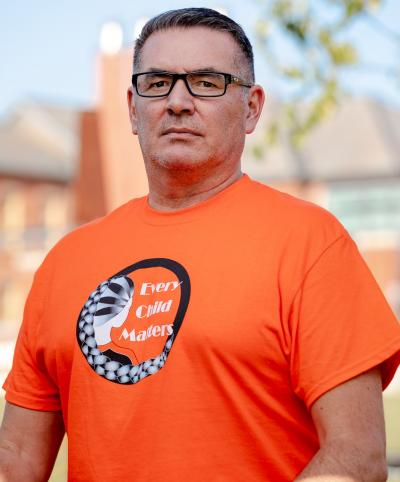
Flags will be flown at half-mast today on Humber campuses and across the country as Canadians reflect on a painful part of the country’s history. September 30, 2021 marks the first annual National Day for Truth and Reconciliation and is also recognized as Orange Shirt Day.
The National Day for Truth and Reconciliation was created to commemorate the tragic legacy of residential schools in Canada. The "schools" are part of an attempted cultural genocide that included loss of language, spirituality and innocence. According to the Truth and Reconciliation Commission (TRC), more than 38,000 children sent to residential schools were subjected to sexual and physical abuse. An unknown number of Indigenous children died at the schools, and gravesites are still being discovered. Residential school survivors and their descendants continue to feel the trauma and impact of the colonial system.
The Humber College community honors those touched by residential schools every year on Orange Shirt Day by hosting events and initiatives leading up to September 30 and wearing orange shirts with the slogan “Every Child Matters.” The t-shirts represent a commitment to honouring the healing journey of Indigenous people.

"It is now time for action, and no longer are words good enough. We must make a disciplined commitment to reconciliation while not ignoring the truth," said Jason Seright, dean of Indigenous Education&Engagement (IE&E).
"All the information and truths are out there. Take the time to educate yourself and understand why reconciliation is important. We now know better and now must do better."
The work towards Truth and Reconciliation at Humber is a shared responsibility, and not something that is up to one person or group.
Recognizing that reconciliation is both a personal and community action - and long overdue - Humber College aims to weave indigenous Ways of Being, Knowing and Doing (IWBKD) into policy, curriculum and everyday interactions. Humber's IE&E department leads the work – and there is a lot of work to be done. Recently, the department created a new position to help evaluate Humber's progress and push it further.

Nahannee Schuitemaker identifies herself as coming from three different spaces: "immigrant, invader and indigenous," phrase she first read in the work of Cree researcher Shawn Wilson. Her father came to Canada from the Netherlands, while her mother is of Mohawk and French-Canadian ancestry.
Schuitemaker is Humber's first Indigenous Curriculum Specialist(ICS) and collaborates and consults with various departments to develop Indigenous curriculum and practicum experiences and quality reviews. She applies her knowledge and experience with Indigenous pedagogies and decolonizing methodologies to build staff capacity for change.
It's an extensive job description.
"We're looking to work with faculties and departments to build coursework, training capacity for their faculty and staff and eventually have someone within each faculty who can contribute to that work," said Schuitemaker.
"My role really speaks to Humber's commitment to bring in more Indigenous and Indigenous-led presence and learn how we can delegate when staff and faculty are equipped with the knowledge and tools to do some of the work themselves."
In her previous role at the college, Schuitemaker supported faculty and staff in Humber's Truth and Reconciliation training, "Four Seasons of Reconciliation," based on the TRC's& Calls to Action. She also helped Humber executives better understand Indigenous peoples and their histories in relation to research.
Schuitemaker acknowledges that using new materials in an appropriate and meaningful way can be intimidating, even if you've received training in best practices.
"It can be nerve-wracking, so we try to vet resources and materials. We're building a support network, because relationships are very key to this work."
She points to the Faculty of Health Sciences & Wellness Early Childhood Education(ECE) program as an example of progressive programming.
ECE's Two-Eyed Seeing initiative encourages future early childhood educators to see the land as a teacher and engage in respectful, reciprocal and responsible relationships with plants, animals and other beings. Recently, ECE students had the opportunity to return to campus after several semesters away due to COVID-19 and participate in a forest walk near the Humber Arboretum. They received teachings from a Knowledge Holder who told them the story of Grandmother Maple and explained the Dish with One Spoon. As a result, the students learn essential context to bring to their future lessons and activities.
Indigenous teachings and ways of knowing are central to Schuitemaker's work with Indigenous and non-Indigenous members of the Humber community. She is helping to build a collective movement rather than an informative program, and she's doing it thoughtfully and with intention.
She's guided by aspects of her Haudenosaunee culture, which she calls her moral compass.
"Before a gathering, ceremony or any meeting of importance, we start with Ohèn:ton Karihwatéhkwen, also called 'the words before all else' or 'the thanksgiving address,'" said Schuitemaker.
"We acknowledge where we sit in relation to creation and the things that make up the world we live in, recognizing we sit in this space of equality and we do things in consideration of all aspects of creation," she said.
The address also inherently considers the lessons of the past by those who came before and those whose faces we’ve yet to see, with the final line of each passage of the address expressing that our minds are one - that we are on the same page.
Schuitemaker and her IE&E colleagues' impact reaches beyond the walls of Humber College, all the way across the world. For example, the department is ;working with longtime Humber international partner Otago Polytechnic in New Zealand to expand and enhance the experience of Indigenous students at both institutions.
While Schuitemaker won't give too much away, she hints at several other programs and initiatives in the works to further& encourage collaboration and reconciliation.
Visit the Indigenous Education & Engagement website for more ways to get involved.